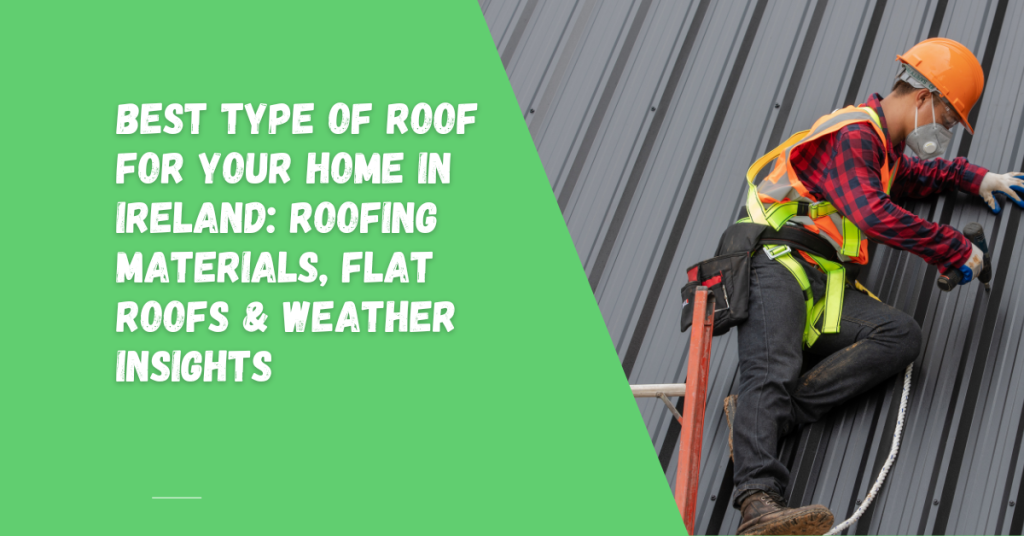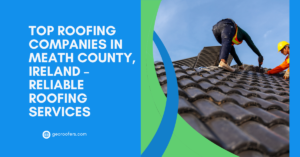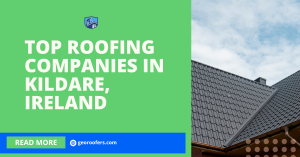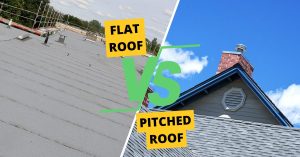Choosing the right roof for your home is one of the most crucial decisions you’ll make in ensuring durability, energy efficiency, and aesthetic appeal. From flat roofs to pitched roofs, and roofing materials like slate, clay, or metal, the options can be overwhelming. This comprehensive guide is here to simplify the process, helping you navigate the best roofing materials for your home, especially in Ireland’s unpredictable weather. Whether you’re planning to build or replace a roof, this article is your go-to resource for making an informed decision.
1. What is the Best Type of Roof for Your Home?
When deciding on the best type of roof, you need to consider factors like the climate, your home’s architectural design, and your budget. A flat roof may suit modern designs, while pitched roofs are ideal for areas with heavy rainfall to prevent water accumulation. In Ireland, where weather conditions include frequent rain and wind, opting for strong and durable materials is essential to ensure longevity and minimize maintenance.
2. Understanding Common Roofing Materials

The material you choose for your roof plays a pivotal role in its durability and performance. Here’s a breakdown of common options:
- Slate: Strong and durable, slate is a premium material that can withstand high winds and heavy rainfall, making it a popular choice in Ireland.
- Clay and Concrete Tiles: Traditionally used for residential homes, these materials offer a balance of aesthetics and longevity.
- Metal Panels: Lightweight yet robust, metals like zinc, copper, and galvanised steel are commonly used for both modern and traditional homes.
- Fibreglass and Membrane Layers: These materials are mostly used for flat roofs, offering excellent insulation and weather resistance.
Each material has its pros and cons, so it’s important to assess your specific needs before deciding.
3. Why Weather Matters When Choosing a Roof in Ireland
Ireland’s unpredictable weather, with heavy rainfall and high winds, requires roofing solutions designed to withstand such conditions. Roofing materials like slate and metal are particularly effective in this environment due to their durability and ability to resist mould and debris. When you install a roof, ensure that it’s properly sealed and insulated to prevent long-term damage.
4. Flat Roofs vs. Pitched Roofs: Which is Right for You?
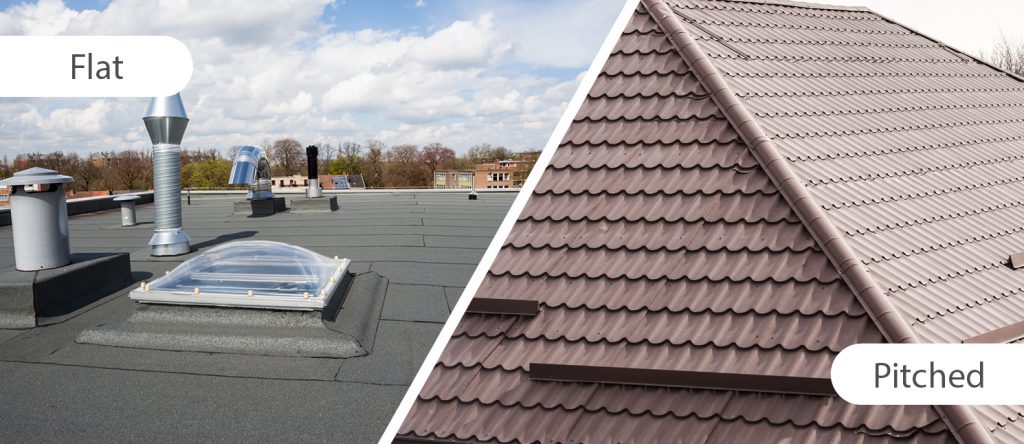
Flat Roofs
Flat roofs are a modern and affordable option for many homeowners. They are commonly seen in extensions and urban homes, offering easy access and a sleek design. However, they can be vulnerable to heavy rainfall if not constructed correctly. Adding a layer of membrane or insulation can help mitigate these risks.
Pitched Roofs
A pitched roof is a more traditional choice, providing better drainage and insulation. These roofs are ideal for areas with frequent rain and can be built using various materials like tiles or metal panels.
5. Energy Efficiency and Insulation in Roof Design
An energy-efficient roof can significantly reduce your heating costs. Opting for materials like slate, metal, or clay tiles, combined with proper insulation, ensures that your home retains heat during cold months. Flat roofs, when designed with PV panels or green roofs, provide an eco-friendly alternative to traditional structures.
6. How Long Do Different Types of Roofs Last?

The lifespan of a roof varies depending on the material used and the quality of installation:
- Slate Roofs: 50-100 years, with minimal maintenance.
- Clay and Concrete Tiles: 30-50 years.
- Metal Roofs: 40-70 years, depending on the type of metal.
- Flat Roofs: 20-30 years with proper care and maintenance.
Regular roof repairs and maintenance are essential to extend the life of any roofing material.
7. Affordable Roofing Options for Homeowners
If you’re working with a tight budget, asphalt shingles and concrete tiles offer affordable yet durable solutions. Flat roofs are also a cost-effective choice, particularly for smaller homes. Rest assured that even with limited funds, you can find strong and durable options to suit your needs.
8. Pros and Cons of Popular Roofing Materials
Slate
- Pros: Durable, weather-resistant, aesthetic appeal.
- Cons: High upfront costs, heavy weight requiring a strong frame.
Clay and Concrete Tiles
- Pros: Affordable, available in a wide range of colours, eco-friendly alternative.
- Cons: Vulnerable to cracking under extreme weather conditions.
Metal
- Pros: Lightweight, resistant to corrosion, available in various colours.
- Cons: Initial costing can be high.
9. Frequently Asked Questions About Roofing
What is the best type of roof for energy efficiency?
Pitched roofs with PV panels or green roofs are highly energy efficient.
How do I maintain my roof in Ireland’s weather?
Regular inspections, timely repairs, and choosing durable materials like slate or metal are key.
What should I look for when hiring a roofer?
Ensure they are experienced, provide an accurate estimate, and use high-quality roofing materials.
10. Tips for Hiring the Right Roofer or Roofing Contractor
Finding the right professional can make all the difference:
- Check reviews and ask for recommendations.
- Ensure they are experienced in installing the roofing material you choose.
- Request an estimate and confirm the timeline for the project.
Key Takeaways
- Roofing Material Matters: Choose slate, metal, or tiles for durability in Ireland’s weather.
- Flat vs. Pitched: Consider your home’s design and rainfall levels.
- Energy Efficiency: Invest in insulation and energy-efficient designs.
- Maintenance Is Key: Regular roof repairs ensure longevity.
- Professional Help: Hire experienced roofing contractors for proper installation.
The right roof is more than just a shelter—it’s an investment in your home’s value and comfort. Choose wisely!
